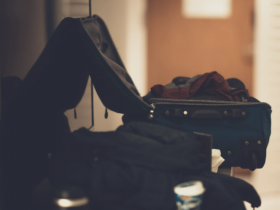Who doesn’t love the idea of holidays? No one. In fact, most people wish to have an extended holiday vacay forever. All of us love the idea of taking a holiday break to de-stress and unwind from the stressors of work, school, and other life battles. The only drawback here is that at the end of the week, you have work or studies and you need to do it.
The holiday season is about to end which means most of us will head back to work or school by next Monday. And this switch from fun to formal distorts sleeping patterns even among the best sleepers. It drains you in the morning but frustratingly makes you unable to doze off at night.
The Truth About Holiday Blues
Most people presume that holidays are the perfect time to catch up on missed nights of sleep, but despite the luxury of long naps, it’s unlikely that a holiday period will refresh your mentality and body.
According to Dr. Neil Stanley, a renowned sleep expert and former chairman of the British Sleep Society, the culprit is those lovely siestas, holiday lie-ins, and fun-packed late nights. These activities alter your body clock which makes it difficult to readjust and wake up in your regular time once you’re back to the daily grind.
Dr. Stanley adds that our body loves predictability and rhythm. In fact, most drowsiness takes place because we’re bad at sticking to regular bedtimes. And holiday vacations are just an exaggerated version when schedules go erratic which lasts for several weeks.
The alteration of sleeping routine in this manner tends to leave us feeling irritable and disoriented, rather than rejuvenated.
Our Body Clock and How It Works On Holidays
The body has a very accurate natural clock and hours before you wake up. It starts to prepare like a computer booting when turned on. Your sleep becomes light, the stress hormones cortisol loose free and body temperature rises to wake you up.
However, when you’re outside of your routine, your body isn’t expecting to wake up by the time your alarm rings. It isn’t ready and is still in deep sleep that’s why you feel so exhausted when you go out of bed. So, when you wake up feeling dozy, groggy and desperate for another hour of sleep, it’s a sign that the natural rhythm of your body is out of sync.
Worry no more as there are simple expert tricks that will not only ease your body clock back into its routine but also helps you to sleep better than ever.
Go Back to Your Routine
The rule of thumb for this trick is simple – be an early bird. Go to bed earlier and get up at your normal work or school time from tonight and continue doing it for the whole weekend. By the next morning, you’ll be on your way to reset your body clock, and you’ll find it easier to get up. You’ll also find it easier to sleep if you have the right type of mattresses.
Cheat Your Clock
If you can’t help but stay late on Friday night, try going to bed a bit earlier on Saturday to return your body clock’s routines. And if it’s still not back to its normal rhythm before Sunday night and all else fails, go to bed one hour earlier to prepare your brain for the waking-time change.
Reset Your Body Clock Through Lighting Setups
You will need light in the morning to set your body’s ‘alert’ mode, so get as much sunshine outside as soon as possible after you wake up. You can also take a walk from home to your work or school. In the evening, dim subdue the lights and switch off your TV and laptop at least an hour before bed.
Do not use your mobile phones and tablets in bed as they emit a type of blue light that can trick your brain into thinking that it’s daytime. It will make you feel wide awake even though you want to wind down for sleep.
Don’t Snooze
While it’s common to feel desperate about having extra minutes of sleep during your first week back at work, pressing the snooze button is the worst thing you can do.
You may go back into deep sleep if you snooze your alarm which makes it harder to wake up, compared to the lighter sleep that occurs an hour before your body’s natural wake-up time. This time, waking up again shocks your body and leaves you feeling horrible and tempted to hit snooze once again. Thus, the vicious cycle continues.
What you can do instead is to set your alarm in the exact time where you have to get up. And as soon as you can bear it, pull your curtains out and let the sunlight enters your room to let your brain know that it’s morning and jump-start your body clock.
Get the Children Back in the Routine
It’s a big myth that children don’t need a fixed bedtime and will just go to sleep when they are tired. This misconception is comparable to the assumption that children stop eating ice cream the moment they’re full! The practice of going to bed and getting up at the same time is even more essential for kids.
Children need to get more sleep compared to adults because it’s crucial to the development of their brain and body. Those who sleep longer have been found to have better class performance and are more likely get a healthy weight. One study even reveals that children who get less than six hours of sleep per night have 30% more probability of obesity.
Try to Neutralize Natural Aging
According to the study conducted by Harvard University, there’s a scientific reason why people find it harder to sleep as they age. The answer is because we lose the brain cells that turn off our thoughts and make it easier for us to sleep. However, a natural approach can compensate for it.
The study facilitated by Louisiana State University found out that drinking cherry juice twice a day within two weeks helps lengthens sleep time by almost 90 minutes among adults who suffer from insomnia.
It turns out that cherries contain high levels of melatonin, a sleep hormone which signals your body when it’s time to sleep together with tryptophan, a precursor to serotonin which aids snoozing.
Schedule Your Meal Time
According to research, eating may affect your internal clock. Apart from keeping a fixed bedtime, scheduling meal times helps you handle changes in work schedules and time zones. So, you must aim to eat at a scheduled time every day to regulate your sleep and keep your internal clock steady.
Eat the Right Bedtime Snack
Scientists found out that a handful of Brazil nuts and glass of milk could help to improve sleep.
According to the experts from Pennsylvania University who study about sleep patterns and diets of more than 4,500 adults, they found certain acids and minerals that help improve your sleeping cycle. In particular, the potassium and selenium found in Brazil nuts contribute to a better sleep, while the dodecanoic and butanoic acids found in milk regulates unbroken sleep patterns.
They also advise avoiding butter and cheese, along with drinking too much and eating salty foods close to bedtime, as these factors contribute to poor quality of sleep.
Turn Off Your Gadgets
Most people become too dependent and obsess with their gadgets which only leads to inadequate sleep. Experts advise that instead of monitoring your sleep every second, getting into bed a bit earlier is a better option.
Takeaway
People have different adaptability, and resetting body clock is no different. While the tricks above help in bringing back your natural circadian rhythm after a weeklong holiday break, you still need to exert effort to make them work. And now that your vacation is almost over, it’s about time to make ends meet again and get back to work.
























